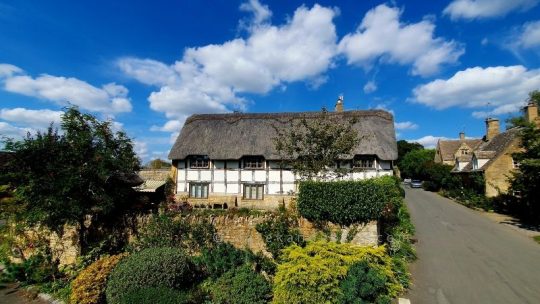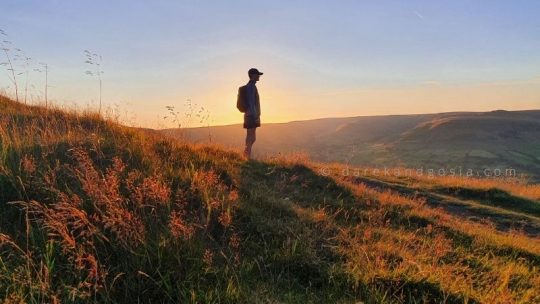What to do in Devon? Top Devon attractions: from Clovelly to Woolacombe Beach and Dartmoor National Park to Exmouth – there are many nice places to visit in Devon.
Devon is a county in the south west of England, with a population of 1.1 million people. It has a coastline stretching over 100 miles and is home to some of the most beautiful scenery in Britain – including Dartmoor and Exmoor National Parks, as well as 25 designated Areas of Outstanding Natural Beauty (AONBs).
Devon is rich in history and culture, with many attractions for visitors from around the world.
Many people come to Devon for its beautiful beaches and coastal walks, but it also has plenty to offer those who like mountains and moorlands.
Where is Devon?
Devon is a county in South West England, bordering Somerset and Dorset to the north, Cornwall to the south-west, and Bristol to the east.
What is Devon famous for?
Devon is one of the most beautiful counties in England. It is famous for its beautiful countryside, beautiful beaches and the Dartmoor National Park.
The county is also famous because it has Britain’s longest river – the River Tamar. It flows through Devon into Cornwall before ending up at Plymouth Sound in Cornwall where it meets the English Channel.
Which part of Devon is best for holiday?
Devon is a great place to visit in the UK, with its rolling landscapes, beautiful coastlines and picturesque villages. It’s an ideal destination for families because there is so much to do and see.
Some popular destinations in Devon include the coastal towns of Exmouth, Sidmouth, and Torquay, which offer beaches, watersports, and scenic coastal walks.
The county also has a number of historic towns and villages, such as Totnes and Dartmouth, as well as the bustling city of Plymouth. Additionally, Devon is home to Dartmoor National Park, which offers opportunities for hiking, cycling, and horse riding.
Is Devon a good option for a UK staycation or a fun weekend getaway?
Yes, Devon is an excellent option for a UK staycation or a fun weekend getaway. With its stunning natural scenery, charming towns and villages, and rich history and culture, Devon offers something for everyone.
If you’re looking for a relaxing break, Devon’s beautiful beaches, countryside, and national parks provide the perfect backdrop for walks, picnics, and outdoor activities. You can also enjoy delicious local food and drink, from fresh seafood to cream teas and locally brewed cider.
For those seeking adventure, there are plenty of opportunities for outdoor activities, including surfing, kayaking, hiking, and cycling. Devon also has several adventure parks, theme parks, and zoos that are great for families and groups.
If you’re interested in history and culture, Devon has many fascinating landmarks and attractions, including castles, museums, and ancient ruins. You can also explore charming towns and villages, such as Dartmouth and Salcombe, which are filled with quaint shops, galleries, and cafes.
Overall, whether you’re looking for a relaxing break or an action-packed weekend, Devon is a great option for a UK staycation or getaway.
Where to stay in Devon?
Devon is a large county with a diverse range of landscapes and attractions, so the best location to stay in will depend on what you’re looking to do and see. Some popular locations and their highlights include:
- Torquay: A seaside town on the English Riviera, known for its beaches, coastal walks, and Victorian architecture.
- Exmouth: A coastal town on the east of Devon, known for its beaches, water sports, and proximity to the UNESCO-listed Jurassic Coast.
- Dartmouth: A picturesque town on the River Dart, known for its maritime heritage, narrow streets, and independent shops.
- Plymouth: A historic port city, known for its naval heritage, Barbican waterfront, and Mayflower Steps, from where the Pilgrims set sail for America in 1620.
- Dartmoor National Park: A wild and rugged landscape of moorland, tors, and rivers, known for its hiking, horse riding, and outdoor activities.
- Devon countryside: Devon is known for its rolling hills, picturesque villages and pretty countryside, ideal for a peaceful and relaxing holiday.
- Devon beaches: Devon offers a wide range of beaches, from surfer’s paradise to family-friendly, with some beaches having Blue Flag status.
What is the best seaside town in Devon?
The seaside towns of Devon have a lot to offer the visitor. From traditional fishing villages to beautiful sandy beaches and quaint coves, there are many options for enjoying the seaside in Devon.
Ilfracombe is one of the best seaside towns in Devon. It has a really nice beach and there are lots of shops and restaurants. Also, it is not too busy so you can relax on the beach or have a walk around.
Best places to visit in Devon
1. The North Devon Coastline
Top Devon places to visit? The North Devon Coastline stretches from Hartland Point in the north all the way down to Bideford Bay on the south coast. The variety of beaches, coves and headlands mean there’s something for everyone here. There are also plenty of attractions along this coastline including Ilfracombe, Woolacombe and Croyde Bay which are all popular tourist destinations.
2. Clovelly
Top 10 places to visit in Devon? Clovelly is a small village located in the county of Devon, England. It is situated on the north coast of Devon, about 20 miles west of the town of Bideford. The village is known for its steep cobbled main street, which leads down to the harbour and is lined with traditional cottages.
Clovelly is a popular tourist destination, known for its picturesque setting and its well-preserved historical character. Visitors to the village can explore the harbour, visit the Clovelly Court Gardens, and take a boat trip to see the local seal colonies. The village is also home to a number of shops, galleries, and pubs, as well as a museum that explores the village’s history and way of life.
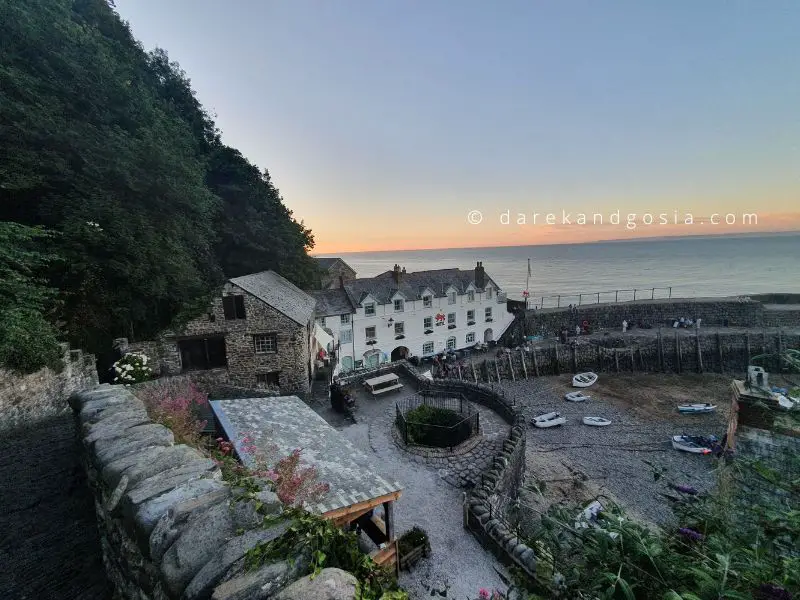
3. Dartmoor National Park
Best places to go in Devon? Dartmoor National Park is a national park in Devon, England that covers an area of 954 square kilometers. It is known for its rugged terrain, which includes high moorland, deep valleys, and granite outcroppings known as tors.
The park is also home to a variety of wildlife, including Dartmoor ponies, sheep, and cows that graze the open moorland. Activities that can be enjoyed in the park include hiking, cycling, horse riding, and rock climbing. The park also has a rich cultural heritage, with many Bronze Age and Iron Age remains, as well as medieval farmhouses and villages.
4. Woolacombe Beach
Devon best places to visit? Woolacombe Beach is a popular tourist destination located in the county of Devon, England. It is situated on the north coast of Devon, about 4 miles northwest of the town of Ilfracombe. The beach is known for its three miles of golden sand and clear blue waters, which make it a popular spot for swimming, surfing, and sunbathing.
It has been awarded Blue flag and Seaside awards, The beach is also popular with families, with a variety of facilities available including toilets, showers, lifeguards and a cafe. The beach is surrounded by dunes, and there is a path that leads to the nearby village of Woolacombe where you can find several shops, pubs and restaurants.
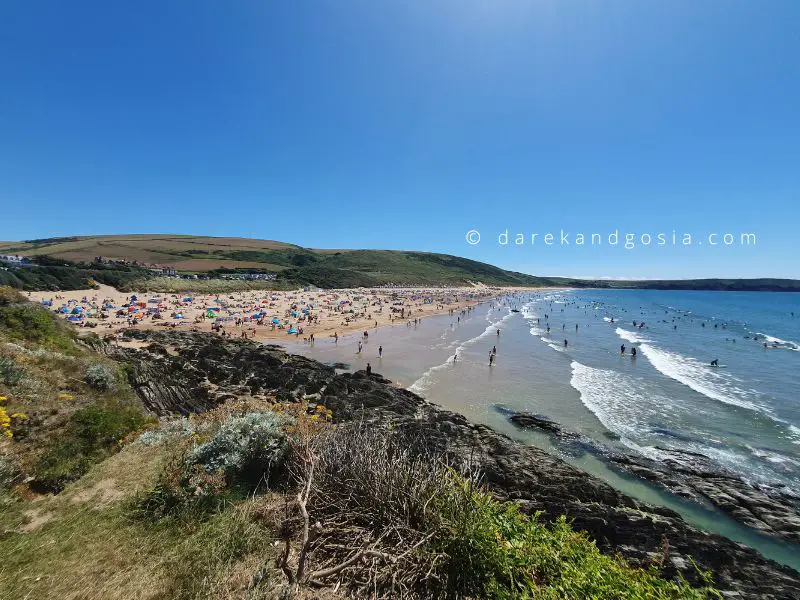
5. Lynton
Nice places in Devon? Lynton is a small town located in the county of Devon, England. It is situated on the north coast of Devon, about 4 miles northwest of the town of Ilfracombe. It is known for its stunning coastal views and its proximity to the Exmoor National Park. The town is often referred to as the “Queen of Exmoor” due to its location on the cliffs high above the sea, which offers panoramic views of the coast.
Lynton has a rich history and is known for its Victorian architecture, including the St. Mary’s Church and the Valley of Rocks. The town has a variety of shops, restaurants, and pubs that cater to tourists. There are also several outdoor activities to enjoy in the area, including hiking, cycling, and horseback riding. The town of Lynmouth is a twin town of Lynton, which is connected by the Lynton & Lynmouth Cliff Railway, a water-powered funicular railway that offers spectacular views of the coast and the surrounding countryside
6. Lynmouth
Places to go in Devon? It is situated on the north coast of Devon, about 4 miles northwest of the town of Ilfracombe. The village is located at the mouth of the River Lyn, from which it gets its name. It is often referred to as the “twin town” of Lynton, which is located on the cliffs above and connected to Lynmouth by the Lynton & Lynmouth Cliff Railway.
Lynmouth is known for its picturesque setting and its proximity to the Exmoor National Park. The village has a charming atmosphere and is home to a number of traditional shops, pubs, and restaurants. Visitors can explore the village’s historic harbor and take in the views of the coast and the surrounding countryside. The village is also a popular spot for outdoor activities such as hiking, fishing and water sports. In 1952, the village suffered a severe flood, which caused widespread damage and loss of life. The Lynmouth Pavilion, which was built as a memorial to the disaster, now serves as a visitor center and exhibition space, where you can learn more about the flood and its impact on the community.
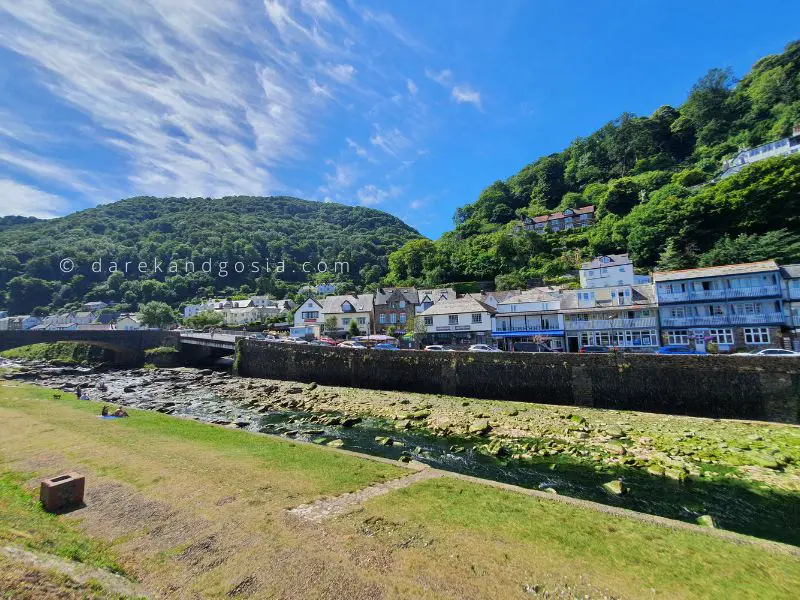
7. Lynton & Lynmouth Cliff Railway
What’s Devon famous for? The Lynton & Lynmouth Cliff Railway is a water-powered funicular railway that connects the twin towns of Lynton and Lynmouth in Devon, England. The railway was built in 1890 and is still in operation today. It is a unique and historic attraction, and one of the steepest and longest water-powered railways in the world.
The railway runs for a distance of 1,500 feet and has a gradient of 1 in 2.75, making the journey quite steep. The train consists of two carriages, each pulled by a water-balance system, with one carriage filled with water on the uphill journey, and then emptying it on the downhill journey. The journey offers spectacular views of the coast and the surrounding countryside.
The railway operates all year round, and is a popular attraction for visitors to the area. There is also a visitor center where you can learn more about the history and operation of the railway, and the towns of Lynton and Lynmouth, which are known for their picturesque setting and Victorian architecture.
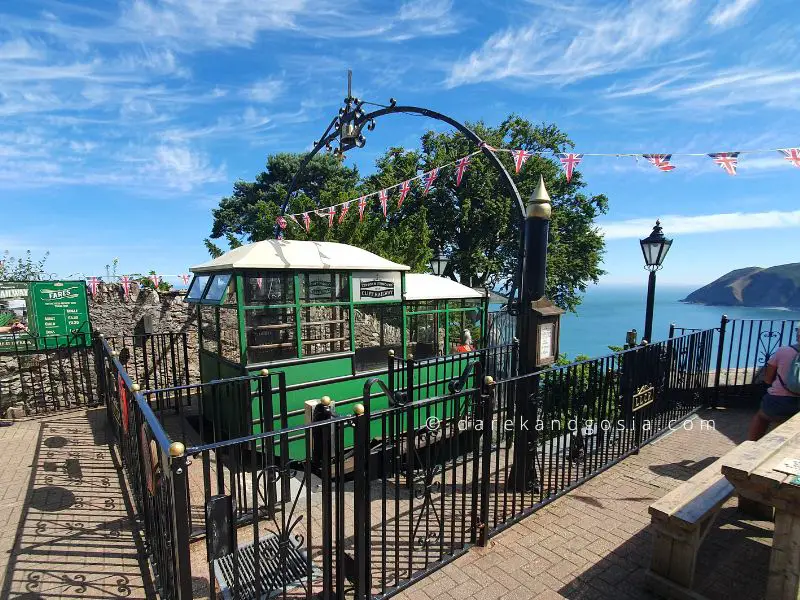
8. Barricane Beach
Most beautiful places in Devon? Barricane Beach, also known as Shell Beach, is a small beach located near the village of Mortehoe in North Devon, England. The beach is known for its vast collection of shells that can be found on the shoreline, that’s where it got its nickname, Shell Beach. The beach is also popular for swimming, sunbathing and rockpooling. It is a great spot for snorkeling and scuba diving as well.
Barricane beach is a small and secluded spot, with a few facilities available like toilets, a beach café, and a beach shop. It is a dog-friendly beach, and dogs are allowed all year round. The beach is also a great spot for wildlife watching as it is home to a variety of coastal birds and marine life. Visitors can also enjoy a scenic walk along the South West Coast Path, which runs along the cliffs above the beach and offers beautiful views of the coastline.
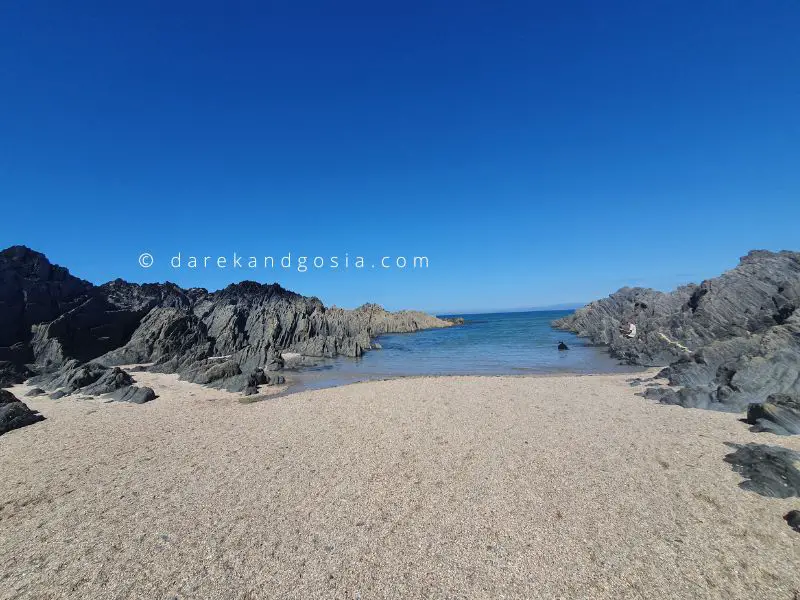
9. Blackpool Sands
Popular locations in Devon? Blackpool Sands is a beach located in Devon, England, near the town of Dartmouth. It is a pebble beach surrounded by a pine forest, which offers a unique experience. The beach is very popular during the summer months, and it is known for its clean and clear water which makes it ideal for swimming.
The beach is also dog-friendly, and there are many facilities available like toilets, showers, and a beach café. Blackpool Sands also offers a variety of activities like kayaking, paddleboarding, and beach volleyball. It is also a great spot for wildlife watching as it is home to many species of birds and marine life. The beach has a Blue Flag award for its cleanliness, safety, and facilities.
10. Sidmouth
Best places to visit in Devon for families? The seaside town of Sidmouth is one of the most popular places to visit in the UK.
Sidmouth has a variety of shops and restaurants, and a great nightlife. With stunning views, sea air and beautiful attractions, you’ll love spending time in this charming town.
It is a tourist destination and is well known for its beaches, which feature in the Sid Valley Area of Outstanding Natural Beauty.
11. Branscombe beach
Top places to visit in Devon? Branscombe beach is a long, pebble beach located in the village of Branscombe, Devon, England. The beach is situated in a beautiful valley and it is surrounded by cliffs and rolling hills. The beach is known for its clear waters and it’s a great spot for swimming and sunbathing. It is also a popular spot for rockpooling and exploring the local marine life.
The beach is also home to the Branscombe Heritage Coast Centre which offers information on the local wildlife, geology and coastal history. Visitors can also take a walk along the South West Coast Path, which runs along the cliffs above the beach and offers beautiful views of the coastline. The beach is also home to the Branscombe Lifeboat Station, which is the oldest lifeboat station in continuous service in the UK. Visitors can learn about the station’s history and the work of the RNLI. The beach is dog-friendly and has a dog-friendly café and a pub where visitors can grab a bite to eat.
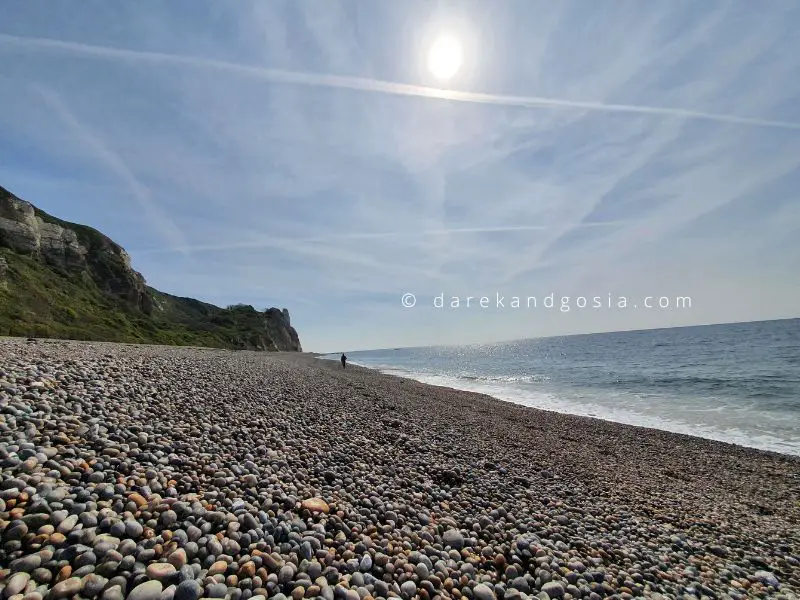
12. Valley of Rocks
Beautiful places in Devon? The Valley of Rocks is a spectacular natural feature located near the village of Lynton and Lynmouth in Devon, England. It is a narrow valley that is carved into the cliffs and filled with large, weathered granite formations known as tors. The valley is home to a variety of wildlife, including wild goats that roam among the rocks.
It is a popular spot for hiking and rock climbing, and offers stunning views of the coast and the surrounding countryside. The Valley of Rocks is also a site of historical and cultural interest, with many Bronze Age and Iron Age remains, as well as evidence of human habitation dating back to the Middle Ages. The valley is part of the Exmoor National Park and is a designated Area of Outstanding Natural Beauty.
13. Exmouth
Places to see Devon? Exmouth is a town and civil parish in East Devon, England. It lies on the south coast of Devon, at the mouth of the River Exe and has a population of 33,000.
Exmouth has been a tourist destination for over 200 years, originally due to its fame as a seaside resort but now also for its status as a gateway town to the Jurassic Coast World Heritage Site.
14. Ilfracombe
Places to visit in Devon England? Ilfracombe is a seaside town located in North Devon, England. It is known for its natural beauty, including a picturesque harbour and a long stretch of sandy beach. The town is also home to a variety of cultural and historical attractions, such as the Museum of Local History, which tells the story of the town and its people, and the Landmark Theatre, which hosts a variety of performances and events.
The town is also famous for its sculptures and outdoor art, including the controversial “Verity” statue by Damien Hirst. Ilfracombe is also home to several restaurants and cafes, which offer a range of local and international cuisine. The town is also popular for its water sports, such as sailing, windsurfing and diving. Visitors can also take a trip to the nearby Exmoor National Park, a beautiful area of moorland, forests and coastline.
15. Lydford Gorge
Devon’s top attractions? Lydford Gorge is a natural gorge located in the county of Devon, England. It is a popular tourist destination, known for its stunning scenery, including steep cliffs, cascading waterfalls and deep pools. The gorge is home to the White Lady waterfall, which is one of the highest in South West England.
The gorge is also a natural habitat for a variety of wildlife, including otters, dippers, and kingfishers. The gorge is popular for hiking and picnicking, and offers a variety of walking trails. It is also an ideal spot for nature photography and bird watching. Visitors can also learn about the history and geology of the gorge at the visitor center. Lydford Gorge is part of the Tamar Trails and is managed by the National Trust.
16. Branscombe
Tourist attractions Devon? Branscombe is situated on the north coast of Devon, England, between Sidmouth and Sidford. It was a fishing village until the 1960s when it became popular with tourists and holidaymakers. In recent years it has become more popular with second-home owners who have bought large houses on the cliffs above the beachfront.
The village lies within the South Devon Area of Outstanding Natural Beauty and has been called “the gateway to Jurassic Coast” due to its close proximity to some of the most visited sites on the Jurassic Coast World Heritage Site such as Lulworth Cove, Durdle Door and Stair Hole.
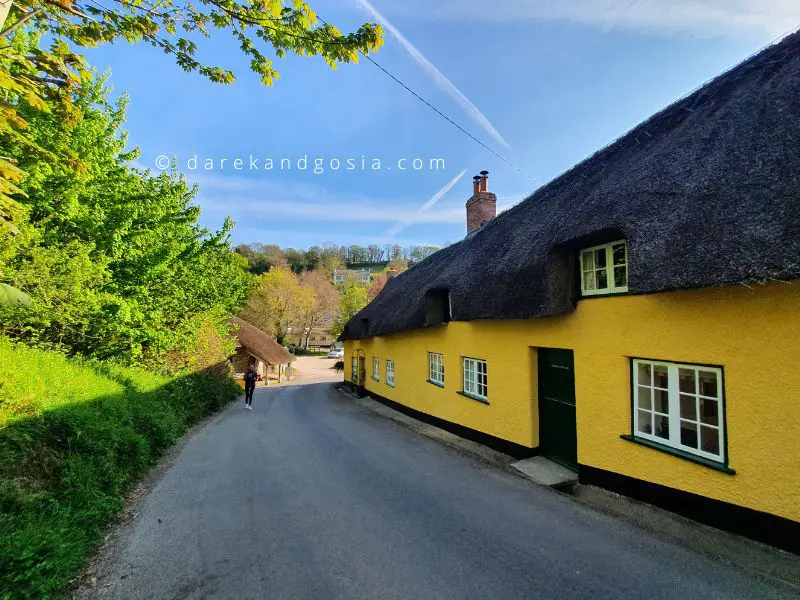
17. Otterton
Places to visit in Devon UK? Otterton is a village in South Devon, England. It is situated about 1 mile (1.6 km) south-east of the town of Sidmouth, on the A35 road between Exeter and Sidmouth. The Otterton Inn is one of the oldest pubs in England and is still run by the same family since it was founded in 1305 by Sir Walter Peryam.
The village has a population of about 300 and is about 1 mile long. It is a popular place for holidays, with many people renting holiday cottages during the summer months. The village also has an award winning tea room (The Otter Inn) which serves home cooked food using local produce. The river Otter runs through the centre of Otterton, giving it its name. The river also provides excellent fishing opportunities for trout and salmon.
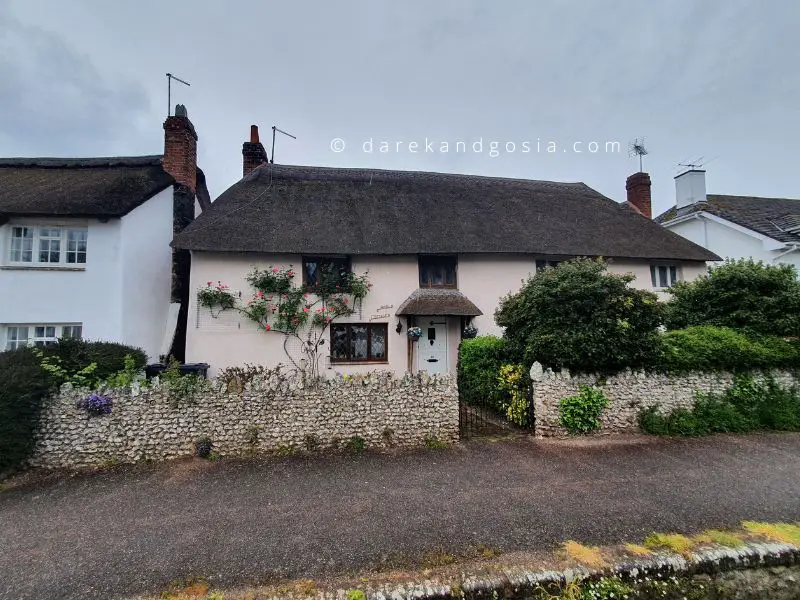
18. South West Coast Path
Places of interest Devon? The South West Coast Path is a 630-mile long National Trail in the south west of England, UK. It runs from Minehead in Somerset to Poole Harbour in Dorset, passing through Devon and Cornwall. The path follows the coastline and offers spectacular views of the sea, cliffs, and beaches. It also passes through a diverse range of landscapes, including coastal towns and villages, beaches, estuaries, and rugged cliffs. The path is popular for hiking, walking and birdwatching, and it can be done in sections or as a whole.
The path is well marked and signposted and there are many guidebooks and maps available to help plan a walk. Along the way, there are many places to stop and rest, as well as accommodation options like B&B’s, hostels, and campsites. The South West Coast Path is considered one of the best coastal walks in the world and is a must-do for any outdoor enthusiast.
19. Seaton
Places to visit Devon? Seaton is a small coastal town located in East Devon, England. It is situated on the River Axe and is known for its picturesque harbour and the nearby Seaton Wetlands, which is a nature reserve and a popular spot for birdwatching. The town is also home to the Seaton Tramway, which is a narrow-gauge electric tramway that runs along the coast to the nearby village of Colyton. Seaton also offers a variety of outdoor activities, such as fishing, swimming, and kayaking, and it is a great spot for water sports such as windsurfing and kite-surfing.
The town is also home to several restaurants and cafes, as well as an array of independent shops, galleries and local produce markets. Seaton is a popular destination for tourists, and it has a good selection of accommodation options, from bed and breakfasts to self-catering holiday homes. Visitors can also take a trip to the nearby Jurassic Coast, a UNESCO World Heritage Site, which is known for its geology and fossil-rich cliffs.
20. Seaton Tramway
Best places to visit Devon? Seaton Tramway is a narrow-gauge electric tramway located in the town of Seaton, Devon, England. It runs for a distance of about 2.5 miles (4 km) along the coast from Seaton to the nearby village of Colyton. The tramway uses restored vintage trams and offers a unique way to explore the local area and its surroundings. Along the route, the tramway offers stunning views of the coast and the countryside, and it passes through the Seaton Wetlands nature reserve, a popular spot for birdwatching.
The tramway also has a stop at the Seaton Jurassic Centre, where visitors can learn about the geology and natural history of the area, and the nearby Beer Quarry Caves, where visitors can explore a limestone quarry that dates back to Roman times. The tramway also has a café and a shop on the station. The trams run regularly during the summer months and weekends in spring and autumn. It’s a popular tourist attraction and a great way to experience the local area and its history.
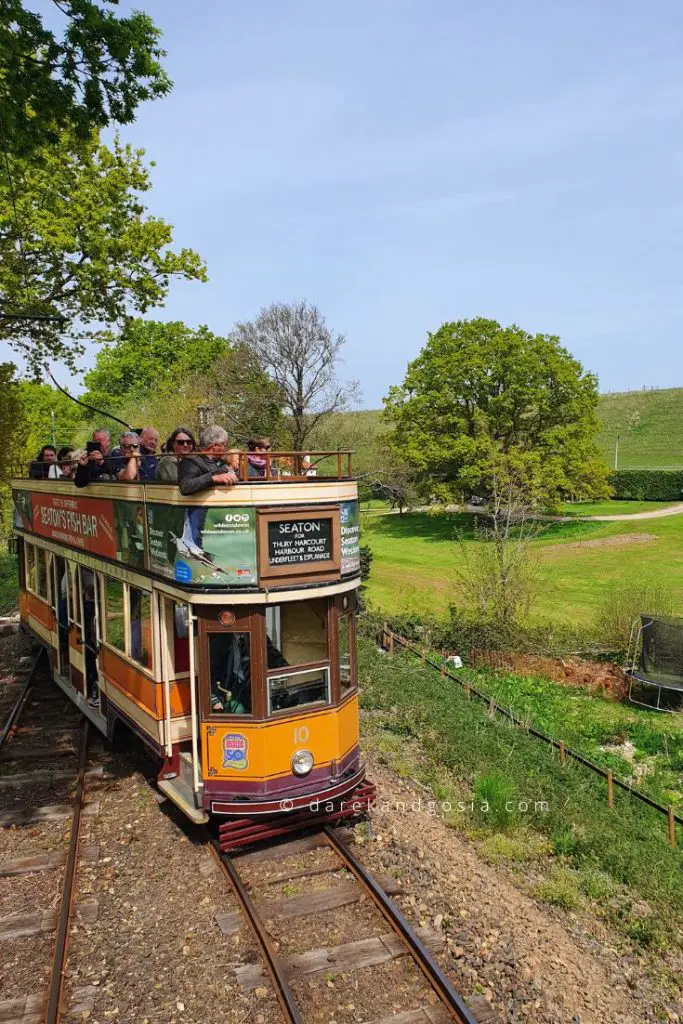
21. Exmouth Beach
Things to do in Devon England? Exmouth Beach is a beach located in Exmouth, Devon, England. It is a long, sandy beach that stretches for 2 miles along the coast. The beach is popular for swimming, sunbathing and other water sports such as windsurfing, kitesurfing and paddleboarding. The beach also offers a variety of activities like beach volleyball, football and beach cricket.
Visitors can also enjoy the beach’s scenic views of the Jurassic Coast, a UNESCO World Heritage Site. The beach is also home to the Exmouth RNLI Lifeboat Station, where visitors can learn about the station’s history and the work of the RNLI.
The beach is also a great spot for nature lovers as it’s home to a wide variety of coastal birds and marine life. There are also several restaurants, cafes and ice cream parlors along the beachfront where visitors can grab a bite to eat.
22. Start Point Lighthouse
Places in Devon to visit? Start Point Lighthouse is a lighthouse located on the Start Point peninsula in Devon, England. It was first built in 1836 and it is still operational today. The lighthouse is located on a headland and it guides ships through the treacherous waters of Start Bay. The lighthouse is now automated and is not open to the public, but visitors can still enjoy the beautiful coastal views from the surrounding area.
The headland is also home to a variety of wildlife, such as seabirds, and it’s a great spot for bird watching. The lighthouse is also a popular spot for hiking and rock climbing. There is a coastal path that leads to the lighthouse and visitors can enjoy a walk along the cliffs to get there. The lighthouse is owned and maintained by the Trinity House, which is the General Lighthouse Authority for England, Wales, the Channel Islands and Gibraltar.
23. Exmoor National Park
Most scenic places in Devon? Exmoor National Park is a national park located in the counties of Devon and Somerset in Southwest England. It covers an area of 267 square miles and is known for its rugged and varied landscape, including high moorland, deep valleys, and coastal cliffs. The park is home to a variety of wildlife, including red deer, wild ponies, and a wide range of bird species. The park offers many outdoor activities like hiking, cycling, horse riding, and rock climbing.
There are many walking trails, including the South West Coast Path, that wind through the park, and a variety of visitor centers that provide information and resources for exploring the park. Exmoor is also rich in cultural heritage, with many medieval farmhouses, Bronze and Iron Age remains, and historic villages. The park has a diverse range of scenic beauty, from heather-clad moors to the rocky coastline, making it an ideal destination for nature lovers and outdoor enthusiasts.
24. Plymouth
Best place to visit in Devon? Plymouth is a major port city with a rich maritime history – it was once home to the British Navy! Plymouth is also famous for being one of Britain’s most important cities during World War Two when many evacuees were sent there from London. Today Plymouth still has many interesting museums dedicated to its wartime past as well as an aquarium and the National Marine Aquarium which houses over 600 species of fish including sharks!
What attracts visitors to Devon?
Devon is a popular tourist destination in the southwest of England, attracting visitors from around the UK and the world. Here are some of the main attractions that draw people to Devon:
- Stunning coastline: Devon is home to over 200 miles of coastline, with beautiful sandy beaches, rugged cliffs, and picturesque fishing villages. Some of the most popular coastal destinations include Salcombe, Torquay, and Woolacombe.
- Natural beauty: Devon has several areas of outstanding natural beauty, including Dartmoor National Park, Exmoor National Park, and the East Devon Area of Outstanding Natural Beauty. These areas offer stunning landscapes, great hiking trails, and plenty of opportunities for outdoor activities.
- History and heritage: Devon has a rich history and is home to many historic sites and landmarks, including castles, cathedrals, and ancient ruins. Some of the most popular historic sites include Exeter Cathedral, Powderham Castle, and the Tintagel Castle ruins.
- Outdoor activities: Devon is a great destination for outdoor activities, with plenty of opportunities for hiking, cycling, surfing, and watersports. There are also several golf courses, horse riding centers, and fishing spots throughout the county.
- Food and drink: Devon is famous for its food and drink, with a range of local specialties, including cream teas, cider, and seafood. There are plenty of restaurants, cafes, and pubs serving up delicious food and drink throughout the county.
- Family-friendly attractions: Devon has several family-friendly attractions, including theme parks, animal parks, and adventure parks. Some of the most popular family attractions include Crealy Adventure Park, Paignton Zoo, and the Milky Way Adventure Park.
How many days do you need in Devon?
The amount of time needed to explore Devon will depend on an individual’s interests and travel plans. There are many things to see and do in Devon, from historic sites, beautiful beaches, and charming towns to outdoor activities such as hiking, cycling, and surfing.
If you want to explore the main tourist attractions of the county, such as Exeter, Dartmouth, Salcombe, and Totnes, you could plan a 3-4 day trip. However, if you want to experience the county’s natural beauty and enjoy outdoor activities like hiking, or want to visit more remote areas, you may want to plan for a longer trip, 7-10 days would be ideal. This would allow you to explore more of the county’s charming villages, countryside and coastline, and also have time to relax and enjoy the local culture and food.
Ultimately, the amount of time you spend in Devon will depend on your interests and priorities.
Devon 4 days itinerary
If you have four days to spend in Devon, here is an itinerary that will help you make the most of your time:
Day 1: Exeter and Dartmoor National Park
- Start your day with breakfast at a local café in Exeter and explore the city’s historic sites, such as Exeter Cathedral, the Roman walls, and the medieval guildhall.
- After lunch, head to Dartmoor National Park, which is just a short drive from Exeter. Take a hike on one of the park’s many trails and enjoy the stunning landscapes, dramatic tors, and ancient stone circles.
- In the evening, return to Exeter for dinner at one of the city’s many restaurants.
Day 2: South Devon Coastline
- Start your day with a visit to the charming fishing village of Brixham. Explore its colorful houses, bustling harbor, and lively market.
- Next, head to the nearby beach of Broadsands and spend some time swimming or sunbathing.
- After lunch, take a drive along the South Devon coastline, stopping at scenic spots such as Berry Head, Slapton Sands, and Blackpool Sands.
- In the evening, check into your accommodation in Salcombe or Dartmouth and enjoy dinner at a local restaurant.
Day 3: Salcombe and Dartmouth
- Start your day with a visit to Salcombe, a picturesque town on the coast. Take a boat trip around the estuary or enjoy a walk along the coastal path.
- Next, head to Dartmouth and visit its historic castle and charming streets. Take a cruise along the River Dart or visit the town’s museum.
- In the evening, return to your accommodation for dinner or try one of the many local pubs.
Day 4: North Devon Coastline
- Start your day with a visit to the stunning beach of Woolacombe, which has been voted one of the best beaches in the UK.
- Next, head to the nearby town of Ilfracombe and explore its charming harbor and Victorian architecture.
- After lunch, take a drive along the North Devon coastline, stopping at scenic spots such as Mortehoe, Lynton, and Lynmouth.
- In the evening, return to Exeter or Plymouth for your departure or spend one more night in Devon to explore other areas.
This itinerary will allow you to see some of the best that Devon has to offer, including its historic sites, stunning landscapes, and charming towns and villages.
How do I spend a day in Devon?
Devon is a beautiful county in southwestern England, known for its stunning coastline, picturesque countryside, and charming towns and villages. Here are some ideas for how to spend a day in Devon:
- Start your day with a traditional English breakfast at a local café or pub. Devon is famous for its delicious cream teas, so make sure to indulge in some scones with jam and clotted cream.
- Visit the historic city of Exeter and explore its ancient cathedral, Roman walls, and medieval guildhall. Take a stroll through the city’s bustling streets and enjoy the vibrant atmosphere.
- Head to the seaside town of Torquay and take a leisurely stroll along its palm-lined promenade. Enjoy the views of the English Channel and visit the iconic Torquay Museum, which houses a collection of local history and art.
- Spend some time at one of Devon’s beautiful beaches, such as Bantham, Saunton Sands, or Woolacombe. Go for a swim in the clear waters, sunbathe on the golden sands, or take a surf lesson.
- Take a walk on the wild side and explore the rugged Dartmoor National Park. Marvel at its stunning landscapes, dramatic tors, and ancient stone circles. Look out for the famous Dartmoor ponies and enjoy a picnic in the great outdoors.
- Visit the charming town of Totnes, with its quirky shops, galleries, and cafes. Take a stroll along the River Dart and explore the town’s fascinating history and architecture.
- Finish your day with a delicious meal at one of Devon’s many restaurants, serving up fresh seafood, locally sourced produce, and traditional English dishes.
These are just a few suggestions for how to spend a day in Devon. With its rich history, stunning landscapes, and vibrant culture, Devon is a wonderful destination to explore.
Devon history
Devon has a rich and varied history that spans back thousands of years. Here are some key events and periods in Devon’s history:
- Prehistoric Times: Devon has evidence of human habitation dating back to the Stone Age, with remains of stone circles and burial mounds scattered throughout the county.
- Roman Era: Devon was an important part of the Roman Empire and was home to several Roman towns and settlements, including Exeter (then known as Isca Dumnoniorum), which was an important military and administrative center.
- Medieval Period: During the Middle Ages, Devon was a center for wool production and trade, which brought great wealth to the region. The county was also home to several important religious sites, including the cathedrals in Exeter and Plymouth.
- Tudor Era: Devon played an important role in the Tudor period, with Plymouth being the starting point for several famous voyages of exploration, including those of Sir Francis Drake and Sir Walter Raleigh.
- Industrial Revolution: In the 18th and 19th centuries, Devon became a center for mining and industry, particularly in the production of tin and copper. The region also saw the growth of several important ports, including Plymouth and Exeter.
- World War II: During World War II, Devon played a key role in the defense of the UK, with several coastal towns and villages being fortified to protect against invasion. Devon was also home to several military bases and was a key location for the training of American and Canadian troops.
Today, Devon is a vibrant and diverse county, with a rich cultural heritage and a thriving tourism industry. Visitors can explore its many historic sites, including castles, cathedrals, and ancient monuments, as well as its stunning landscapes, picturesque villages, and vibrant towns and cities.
Devon tourist information
Devon is a popular tourist destination in the southwest of England, known for its stunning coastline, picturesque villages, historic sites, and vibrant cities. Here is some tourist information to help you plan your visit to Devon:
- Getting there: Devon is easily accessible by road, rail, and air. The county is well-connected to other parts of the UK by road and rail, and there are several airports nearby, including Exeter Airport and Bristol Airport.
- Accommodation: Devon has a wide range of accommodation options to suit all budgets and preferences, including hotels, bed and breakfasts, guesthouses, and self-catering cottages. There are also several campsites and caravan parks throughout the county.
- Attractions: Devon has plenty of attractions to keep visitors entertained, including historic sites, museums, galleries, and theme parks. Some of the most popular attractions include Dartmoor National Park, Exeter Cathedral, Plymouth Hoe, and the Eden Project in nearby Cornwall.
- Activities: Devon is a great destination for outdoor activities, with plenty of opportunities for hiking, cycling, surfing, and watersports. There are also several golf courses, horse riding centers, and fishing spots throughout the county.
- Food and drink: Devon is famous for its food and drink, with a range of local specialties, including cream teas, cider, and seafood. There are plenty of restaurants, cafes, and pubs serving up delicious food and drink throughout the county.
- Tourist Information Centers: There are several tourist information centers located throughout Devon, including in Exeter, Plymouth, and Torquay. These centers offer advice and information on local attractions, events, and activities, as well as maps and guidebooks.
Overall, Devon is a great destination for a UK holiday, with plenty to see and do for visitors of all ages and interests.
Which beaches are sandy in Devon?
Devon boasts a wide range of beaches, from rocky coves to long stretches of golden sand. Some popular sandy beaches in Devon include:
- Woolacombe Beach: This long, sandy beach is located in North Devon and offers excellent surf conditions and spectacular coastal views.
- Croyde Bay: This beach is also located in North Devon and is popular with surfers and families.
- Salcombe South Sands: This sandy beach is located in the popular town of Salcombe and is known for its sheltered location and clear waters.
- Putsborough Sands: This beach is located near Woolacombe and is known for its long stretch of golden sand and excellent surf conditions.
- Exmouth Beach: This beach is located near the town of Exmouth and offers a long stretch of golden sand, as well as excellent opportunities for swimming, sunbathing and watersports.
- Instow Beach: This sandy beach is located near Bideford and is popular with families, as well as windsurfers and kitesurfers.
- Westward Ho!: This beach is located near Bideford and is known for its long stretch of golden sand and excellent surf conditions.
- Saunton Sands: This beach is located near Braunton and is a popular spot for surfing and sunbathing.
It’s recommendable to check the tide, weather, and season when choosing a beach, as some may be more crowded during the summer, or have more dangerous currents during low tide.
What is the best town to stay in Devon?
The best town to stay in Devon will vary depending on an individual’s interests and needs. Some popular towns to consider include:
- Exeter, the county town, has a rich history and a variety of shops, restaurants and cultural activities.
- Dartmouth, is a picturesque town located on the River Dart, known for its medieval architecture and maritime heritage.
- Salcombe, is a picturesque seaside town with an active sailing community and beautiful beaches.
- Totnes, is a historic market town with a bohemian atmosphere, independent shops and a variety of restaurants and cafes.
- Lynton and Lynmouth, known as Little Switzerland, is a charming village set on the coast with scenic walks, great views and beautiful beaches.
It’s recommendable to check each town’s pros and cons depending on what you are looking for, and pick the one that better suits your needs and preferences.
What are Devon people called?
Devon people are called “Devonians” or “Devonians”. They are also sometimes referred to as “Devonians” or “Devonians”.
What famous film was filmed in Devon?
Several famous films have been filmed in Devon over the years, but perhaps the most well-known is Steven Spielberg’s “War Horse” (2011). The film, which is based on the novel by Michael Morpurgo, tells the story of a young boy and his horse during World War I. Much of the filming took place in Dartmoor National Park, which provided a stunning backdrop for many of the film’s scenes. Other famous films that have been filmed in Devon include “Sense and Sensibility” (1995), “The Remains of the Day” (1993), and “The French Lieutenant’s Woman” (1981).
What is the best beach in Devon?
There are many nice beaches in Devon including:
- Woolacombe Beach: This long, sandy beach is located in North Devon and offers excellent surf conditions and spectacular coastal views.
- Croyde Bay: This beach is also located in North Devon and is popular with surfers and families.
- Blackpool Sands: This secluded, shingle beach is located near Dartmouth and is known for its clear blue waters and beautiful scenery.
- Salcombe South Sands: This sandy beach is located in the popular town of Salcombe and is known for its sheltered location and clear waters.
- Putsborough Sands: This beach is located near Woolacombe and is known for its long stretch of golden sand and excellent surf conditions.
Is Devon better than Cornwall?
Both Devon and Cornwall have their own unique attractions and qualities. Devon is known for its picturesque countryside, historic towns, and famous cream teas, while Cornwall is famous for its rugged coastline, charming fishing villages, and mild climate.
Both counties offer a wide range of activities and attractions such as beaches, hiking, and surfing, as well as cultural and historical sites. It would be more accurate to say that they are different and have different things to offer visitors.
What is the capital of Devon?
The capital of Devon is Exeter. It is a historic cathedral city located in the southwest of England. Exeter has a rich history dating back to Roman times and features a variety of cultural and historical sites, including Exeter Cathedral, the Royal Albert Memorial Museum, and the medieval underground passages. It also has a range of shops, restaurants, and cultural activities, making it a popular tourist destination.
What is the best village in Devon?
The best village in Devon will depend on an individual’s preferences, but some popular choices include:
- Clovelly, which is a charming village located on the north coast of Devon. It is known for its steep cobbled streets and picturesque harbor.
- Croyde, is a traditional thatched village located in North Devon, known for its surfing and beautiful beaches.
- Salcombe, is a picturesque seaside village located on the south coast of Devon. It is known for its sailing and boating community, as well as its charming streets lined with independent shops and restaurants.
- Lydford, is a small village located in the heart of Dartmoor, it’s known for its medieval castle, beautiful countryside and the Lydford Gorge.
- Chagford, is a charming market town located on the edge of Dartmoor, it’s known for its well-preserved medieval architecture, and the many independent shops and galleries.
Does it rain a lot in Devon?
Devon, like the rest of the UK, experiences a moderate amount of rainfall throughout the year. The county generally has mild winters and cool summers. Rainfall varies depending on the location and season.
Coastal towns are often cooler and wetter than inland areas. The south coast of Devon tends to be drier than the north coast, particularly during the summer months. Devon also experiences occasional heavy rain and storms, particularly during the autumn and winter months. It is always a good idea to check the weather forecast and come prepared when planning to visit Devon or any other place in the UK.
Is Devon bigger than Cornwall?
Devon and Cornwall are both counties located in the southwest of England. Devon is slightly larger than Cornwall in terms of land area. Devon covers an area of 6,707 square kilometers (2,590 square miles) while Cornwall covers an area of 3,563 square kilometers (1,376 square miles). Both counties have a diverse range of landscapes, from rugged coastline to rolling countryside, and both have their own unique attractions and cultural heritage.
Is Devon good for families?
There are plenty of reasons to visit Devon with your family. It’s one of the most beautiful and unspoilt counties in the UK, so there’s plenty to see and do. If you’re looking for somewhere to stay, we’ve got a great selection of self-catering cottages in Devon which will make a perfect base for your family holiday.
Why do people move to Devon?
There are many reasons why people move to Devon. Some of the most common reasons include:
- Scenic beauty: Devon is known for its picturesque countryside, rugged coastline, and charming towns and villages. Many people are attracted to the county’s natural beauty and enjoy outdoor activities such as hiking, cycling, and surfing.
- Quality of life: Devon is known for its relaxed pace of life and friendly communities. Many people find that living in Devon allows them to enjoy a better work-life balance and spend more time with family and friends.
- Cost of living: Devon is considered to be relatively affordable compared to other areas of the UK, making it a popular choice for people looking to move out of the city.
- Employment opportunities: Devon has a diverse economy, including tourism, agriculture, and manufacturing sectors, which provide employment opportunities for people with a wide range of skills and experience.
- Education: Devon has a good reputation for its education system, with many primary schools and secondary schools rated highly by Ofsted.
- Cultural heritage: Devon has a rich cultural heritage, with many historic towns, castles, and monuments, as well as a vibrant arts scene.
- Access to other locations: Devon is well-connected to other parts of the UK, with good road and rail links, making it an attractive option for people who need to travel frequently for work or other reasons.
Best places near Devon to visit
There are many wonderful places to visit near Devon, each with its own unique attractions and charm. Here are ten of the best places to visit near Devon:
- Cornwall: Just across the border from Devon, Cornwall is known for its beautiful coastline, stunning beaches, and picturesque fishing villages.
- Bath: This historic city is famous for its Roman Baths, Georgian architecture, and charming cobbled streets.
- Bristol: A vibrant and cosmopolitan city with a rich maritime history, Bristol is known for its street art, music scene, and bustling harbor.
- Jurassic Coast: This stretch of coastline in Dorset is a UNESCO World Heritage site and is known for its stunning cliffs, coves, and rock formations.
- Stonehenge: This prehistoric monument is one of the UK’s most iconic landmarks and is located just a short drive from Devon.
- Exmoor National Park: Located on the border of Devon and Somerset, this beautiful national park is known for its rugged moorland, rolling hills, and stunning coastline.
- Glastonbury: This charming town in Somerset is known for its links to Arthurian legend, as well as its famous music festival.
- Plymouth: This historic naval city is home to several fascinating museums and landmarks, including the National Marine Aquarium and the Plymouth Hoe.
- The Cotswolds: This picturesque region of rolling hills, charming villages, and beautiful countryside is located just a short drive from Devon.
- The Isles of Scilly: Located off the coast of Cornwall, the Isles of Scilly are a group of stunning islands known for their beautiful beaches, crystal-clear waters, and tranquil atmosphere.
Is Devon worth visiting?
Yes, Devon is definitely worth visiting! This beautiful county in southwest England has a lot to offer visitors, from stunning beaches and dramatic coastline to picturesque villages, historic landmarks, and areas of outstanding natural beauty. Whether you’re looking to relax and unwind, explore the great outdoors, or immerse yourself in history and culture, there’s something for everyone in Devon.
Some of the top attractions in Devon include the Dartmoor and Exmoor national parks, the Jurassic Coast World Heritage Site, the historic city of Exeter, and charming towns like Salcombe, Dartmouth, and Sidmouth. Devon is also famous for its delicious food and drink, including cream teas, cider, and fresh seafood.
Whether you’re looking for a relaxing seaside break, an active outdoor adventure, or a cultural city break, Devon is definitely worth a visit. With so much to see and do, you’re sure to have a memorable and enjoyable trip.
